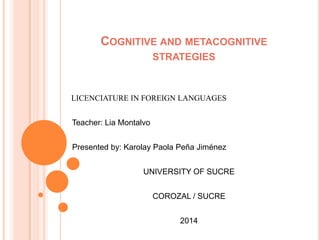
Cognitive and metacognitive strategies.
- 1. COGNITIVE AND METACOGNITIVE STRATEGIES LICENCIATURE IN FOREIGN LANGUAGES Teacher: Lia Montalvo Presented by: Karolay Paola Peña Jiménez UNIVERSITY OF SUCRE COROZAL / SUCRE 2014
- 2. COGNITIVE STRATEGIES Cognitive strategies are one type of learning strategy that learners use in order to learn more successfully. According to O'Malley and Chamot (1990: 44), cognitive strategies 'operate directly on incoming information, manipulating it in ways that enhance learning'. Learners may use any or all of the following cognitive strategies (see Cook, 1993 114- 115):
- 3. resourcing, i.e., having recourse to dictionaries and other materials; translation, that is, using their mother tongue as a basis for understanding and/or producing the target language; note-taking; deduction, i.e., conscious application of L2 rules; contextualization, when embedding a word or phrase in a meaningful sequence; transfer, that is, using knowledge acquired in the L1 to remember and understand facts and sequences in the L2; inferencing, when matching an unfamiliar word against available information (a new word etc.); question for clarification, when asking the teacher to explain, etc. There are many more cognitive strategies in the relevant literature. O'Malley and Chamot (1990) recognise 16.
- 4. EXAMPLES OF COGNITIVE STRATEGIES Concept Mapping Visualization Making Associations Chunking Questioning Scanning Underlining Using Mnemonics Sounding out words Self-checking and Monitoring.
- 6. METACOGNITIVE STRATEGIES Metacognitive-like processes are especially ubiquitous when it comes to the discussion of self- regulated learning. Being engaged in metacognition is a salient feature of good self-regulated learners. Groups reinforcing collective discussion of metacognition is a salient feature of self-critical and self-regulating social groups. The activities of strategy selection and application include those concerned with an ongoing attempt to plan, check, monitor, select, revise, evaluate, etc.
- 7. ACCORDING TO WENDEN According to Wenden (1998: 34), 'metacognitive knowledge includes all facts learners acquire about their own cognitive processes as they are applied and used to gain knowledge and acquire skills in varied situations'. In a sense, metacognitive strategies are skills used for planning, monitoring, and evaluating the learning activity; 'they are strategies about learning rather than learning strategies themselves' (Cook, 1993: 114). Let us see some of these strategies:
- 8. directed attention, when deciding in advance to concentrate on general aspects of a task; selective attention, paying attention to specific aspects of a task; self-monitoring, i.e., checking one's performance as one speaks; self-evaluation, i.e., appraising one's performance in relation to one's own standards; self-reinforcement, rewarding oneself for success.
- 9. At the planning stage, also known as pre-planning (see Wenden, 1998: 27), learners identify their objectives and determine how they will achieve them. Planning, however, may also go on while a task is being performed. This is called planning-in-action. Here, learners may change their objectives and reconsider the ways in which they will go about achieving them. At the monitoring stage, language learners act as 'participant observers or overseers of their language learning' (ibid.), asking themselves, "How am I doing? Am I having difficulties with this task?", and so on. Finally, when learners evaluate, they do so in terms of the outcome of their attempt to use a certain strategy. According to Wenden (1998: 28), evaluating involves three steps: 1) learners examine the outcome of their attempts to learn; 2) they access the criteria they will use to judge it; and 3) they apply it.
- 10. METACOGNITIVE KNOWLEDGE Metacognition includes at least three different types of metacognitive awareness when considering metacognitive knowledge: Declarative Knowledge: refers to knowledge about oneself as a learner and about what factors can influence one's performance. Declarative knowledge can also be referred to as "world knowledge". Procedural Knowledge: refers to knowledge about doing things. This type of knowledge is displayed as heuristics and strategies. A high degree of procedural knowledge can allow individuals to perform tasks more automatically. This is achieved through a large variety of strategies that can be accessed more efficiently. Conditional knowledge: refers to knowing when and why to use declarative and procedural knowledge. It allows students to allocate their resources when using strategies. This in turn allows the strategies to become more effective.
- 11. METACOGNITIVE REGULATION Similar to metacognitive knowledge, metacognitive regulation or "regulation of cognition" contains three skills that are essential. Planning: refers to the appropriate selection of strategies and the correct allocation of resources that affect task performance. Monitoring: refers to one's awareness of comprehension and task performance Evaluating: refers to appraising the final product of a task and the efficiency at which the task was performed. This can include re-evaluating strategies that were used.